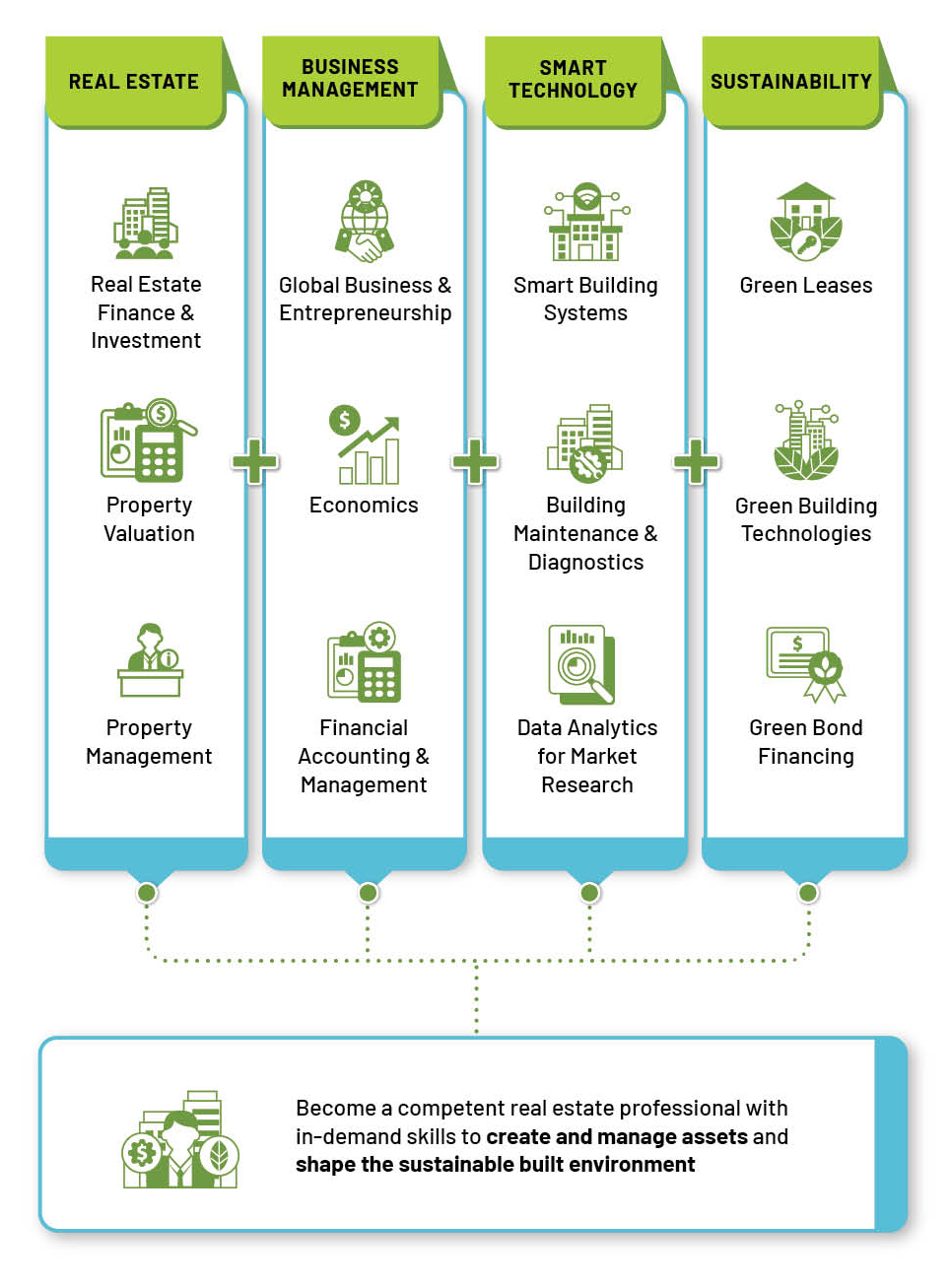Why REB?
- The only business diploma with a focus on professional real estate practices, including real estate investment and finance, valuation, and property management
- Our twin focus on smart technology and sustainability for the built environment sector equips you with in-demand skills to seize new opportunities
- Learn from industry experts such as Knight Frank and Mapletree through masterclasses, workshops and industry-sponsored projects
- Gain highly sought-after professional certifications to kickstart your career
About REB
If you have an interest in real estate and business management, this course is right up your alley! The Diploma in Real Estate Business (REB) equips you with industry-relevant skills in asset management and valuation, land planning and redevelopment, as well as future-ready competencies. The only poly diploma of its kind, our unique curriculum opens doors to many exciting possibilities in business and real estate – you can even contribute to shaping future cities!
REB provides you with comprehensive knowledge in
real estate and more. You will build a strong foundation
in business fundamentals while honing a wide range of
in-demand skills. You will also develop your expertise in
smart technology, including knowledge of smart building
systems and data analytics. Plus, our new modules in
real estate sustainability ensure you stay ahead of the
curve
Our partnerships with industry leaders, such as Knight
Frank and Mapletree offer you practical experience
in facilities and mall management. You will also have
opportunities to participate in Service-Learning projects
with industry. For instance, REB students worked with
HDB to promote financial literacy at the MyNiceHome
Roadshow.
REB will open doors to careers in property valuation
and development; as well as marketing and
management of commercial, industrial and residential
properties. You can also explore opportunities in urban
planning and investment, helping property developers
and investors maximise their profits. With your
knowledge of smart and sustainable building practices,
you will be well prepared for jobs in the green economy.
Gain industry recognition and additional professional certifications such as the Autodesk BIM, Fire Safety Manager* and bizSAFE that will give you an added edge!
*Subject to fulfilment of all requirements
Highlights of Skills & Competencies

Unique Learning Experiences
Empowering Future Talents - Mapletree-Ngee Ann Polytechnic Scholarship REB recipients sharing their experience interning at Mapletree. Read what See Wei Shan and Ethan Tan’s mentors commenting on their growth and exposure in Real Estate Business.
Further Studies
As an REB graduate, you may be given credit exemptions or advanced standing when you apply to study in related degree courses. These related degree courses include:
Singapore
- National University of Singapore
- Bachelor of Business Administration (Real Estate)
- Bachelor of Engineering (Infrastructure and Project Management)
- Singapore Management University
- Bachelor of Business Management
Australia
- University of New South Wales
- Bachelor of Construction and Property Management
- Bachelor of Construction and Property Management
- University of Melbourne
- Bachelor of Design
- Bachelor of Design
- Queensland University of Technology
- Bachelor of Business
- Bachelor of Business
United Kingdom
- University of Cambridge
- Bachelor of Art in Land Economy
- Bachelor of Art in Land Economy
- University London
- Bachelor of Science Urban Planning and Real Estate
- Bachelor of Science Urban Planning and Real Estate
- University of Reading
- Bachelor of Science in Real Estate
- Bachelor of Science in Investment & Finance in Property
- Bachelor of Science in Real Estate
- Heriot-Watt University
- Bachelor of Science in Urban Planning and Property Development
Careers
Upon graduation, you can work across the real estate industry or with finance and investment firms in asset management, such as REITs. Exciting and rewarding careers include:
- Administrative Executive
- Customer Service Specialist
- Environment, Health and Safety Specialist
- Fire Safety Manager
- Leasing Executive
- Management Support Executive
- Marketing Executive
- Planning Executive
- Property Finance & Loans Officer
- Property Management Executive
- Real Estate Investment Executive
- Valuation Officer
- Workplace Safety Officer
Entry Requirements
AGGREGATE TYPE ELR2B2-B
To be eligible for consideration, candidates must have the following GCE ‘O’ Level examination (or equivalent) results.
| Subject | 'O' Level Grade |
|---|---|
| English Language | 1-6 |
| Additional Mathematics/Mathematics | 1-6 |
| Any one of the 2nd group of Relevant Subjects for the ELR2B2-B Aggregate Type | 1-6 |
Applicants must also fulfil the aggregate computation requirements for the ELR2B2-B Aggregate Type ( English Language, 2 relevant subjects and 2 other best subjects) listed at www.np.edu.sg/docs/ELR2B2.pdf.
For students with other qualifications, please refer to the NP website for the entry requirements and admissions exercise period.
Candidates who have completed the Higher NITEC in Facility Management and issued with the Fire Safety Manager Certificate will be exempted from the Fire Safety Management module in this diploma.What You Will Learn
DE Experience
This module is a week-long intense exposure to the aspects of Design, Sustainability and Technology in the Design and Built Environment industries. Students will gain an understanding to the fundamentals of sustainability and the application of technology using Human Centric Design methodology to propose solutions to the sustainability challenges. Students will have the opportunity to collaborate with other DE students from different courses and this will allow them to understand the common sustainability goals and challenges in the Design & Built Environment industries.
Introduction to Real Estate & Sustainability
This module introduces the concept of sustainability and climate change and the challenges to resource depletion through examining the need for review of current practices in agriculture, farming, fisheries, water supply, de-forestation, traditional and renewable energy sources, manufacturing, waste management, buildings, transport, cities, tourism, and consumerism. The pillars of sustainable development including economics, environment, social and governance are discussed. Sustainable Development Goals as enunciated by United Nations and the Singapore Green Plan 2030 are discussed. The business of real estate will be explored through the process of property development and asset management. The contribution to sustainability and climate change mitigation and adaptation will be discussed in the stages of property development and asset management including planning, design, construction, financing, investment, marketing, leasing, management and use.
Sustainable Building Technologies
This studio-based learning module introduces students to the various components making up a building and provides them with an understanding of sustainable construction technologies, particularly the adoption of green materials to achieve a sustainable building environment. In tandem with the building industry’s push towards Integrated Digital Delivery, students will learn about how Building Information Modelling (BIM) can be used for management of completed buildings. They will learn how to read a BIM model, to reflect changes to the building components of a BIM and calculate rentable spaces. This complements the learning of relevant marketing, property and facilities management modules.
Environmental Services & Workplace Safety
This module covers the general aspects of environmental services, including the study of vector and pest control, cleaning services, security services and landscape services to help sustain a clean and livable environment. Students also learn to apply these concepts and principles to health management, and to develop appropriate capabilities on workplace safety and health. Students will have an overview of refuse disposal, characteristics of solid waste and the corresponding environmental and health impacts. Current methods of refuse collection such as pneumatic waste conveyance system will also be introduced. Students will be able to attain bizSAFE Level 2 certification upon successful completion of the module.
Career & Professional Preparation I
This module helps to introduce students to their three-year diploma course curriculum; the real estate industries and how they can prepare themselves to meet the industries requirements and needs. Through the module, students will be required to explore, grow and reflect on how they can serve in these industries. This module is also designed holistically for the contribution towards the overall well-being of the society as we prepare our students to succeed in their careers by helping the students to transcend and link their academic studies to skills and character development. The module will take a student-centric approach to introduce multiple pathways to develop students of different abilities to their fullest potential during and after obtaining their diploma. The pathways include industry partnerships and students’ participation through SkillsFuture initiatives. Through the module, students should be able to embark on their course with the end in mind after guided reflection of their personal characteristics, and producing an overall game plan for their future education and career goals. The module also aims to deepen students’ commitment to the real estate sectors.
Confident Communication: Find Your Voice (VOICE)^ (3 credit units)
The VOICE module aims to empower students to become thoughtful and confident communicators able to tailor a message to suit audience, purpose and context. Students will learn how to use storytelling structures and techniques, persuasive strategies and effective visuals to connect meaningfully with their audience. Through a personalised growth plan, the module encourages students to reflect, set goals and take ownership of their growth and development as communicators. The module employs engaging teaching strategies such as games, thinking routines, masterclasses and workshops, and a celebratory showcase festival at the end to make learning fun and exciting.
Health & Wellness^ (1 Credit Unit)
This is a Level 1 Core module for all Year 1 students. The module will introduce students to the importance of maintaining both physical and mental health through the knowledge and monitoring of health indicators, and application through appropriate exercises. The aim of the module is to empower students with basic knowledge and skills to be independent and responsible in maintaining overall personal health.
Innovation Made Possible^ (3 Credit Units)
This module aims to help students discover and hone their innate ability to think creatively and come up with innovations to tackle problems close to their hearts. Underpinned by the Design Thinking framework, students will be sensitised to the process of user-centric problem solving. They will be introduced to concepts such as empathy, problem-definition, ideation, prototyping and testing through a practical approach featuring engaging out-of-classroom activities, just-in- time master-classes and a hands-on, “learning by doing” delivery format. Ultimately, the module will help students recognise that innovation is attainable and fun and develop creative confidence to explore new ideas in their studies and beyond.
English Language Express^* (Credit Units - NA)
English Language Express aims to give you a better grounding in the English Language and to strengthen the written and oral communications skills that you will need in your academic and professional careers. You will be engaged in writing, reading, listening and speaking activities that will develop your ability to speak and write grammatically, coherently and clearly. You will also hone your reading and listening comprehension skills.
^ Critical Core modules account for 10 credit units of the diploma curriculum. They include modules in innovation and world issues, as well as an interdisciplinary project. By bringing students from diverse diplomas together, the interdisciplinary project fosters collaboration to explore and propose solutions for real-world problems. NP aims to develop students to be agile and self-directed learners, ready for the future workplace.
^* For selected students only
Global Business & Entrepreneurship
This module will provide the students with an understanding of the criticality of the global business environment we are operating in and the challenges facing Singapore businesses as they expand overseas. Students will learn to appreciate the entrepreneurial skills needed to flourish in such an environment. This module will apply a mixture of case studies, guest lectures, real estate game simulations as well as field visits where applicable. Where available, we will expose the students to existing available programmes, case studies, field trips and lectures related to entrepreneurship and global real estate. Further, students gain an understanding of practices exposure to the experiences of entrepreneurs and understanding of the realities of business start-up.
This module involves the study of the interactions between individuals, groups, organisations and institutions with regard to the use of resources to satisfy individual wants and societal needs to regulate economic activity within the socio-economic environment. In micro-economics, the topics examine how consumers, households and firms make economic decisions; how they interact to determine the quantity and price of goods, factors of production and the allocation of resources. In macro-economics, the topics examine the determination of real income, employment, price level and inflation in an open economy, and the conduct of macro-economic policy.
The module will provide students with adequate entry level knowledge of economic theory for the critical analysis, logical reasoning and problem-solving skills towards social policy formulation and individual decision-making.
Financial Accounting & Management
This module covers basic concepts of accounting, including the accounting equation, the double-entry system of book-keeping and the preparation of financial statements. It provides students with the technical knowledge to prepare simple accounts and cash budget, and interpret financial reports for sole proprietor, partnership, and non- profit organisation. This module provides students with the knowledge to understand basic accounting theories, concepts and conventions. The overall objective and outcome seek to equip students with the skills to interpret, analyse and use financial accounting information for financial management decision making purposes. This module will also cover budgeting. The ultimate domain knowledge will also seek to play a critical role in maintaining integrity, professionalism and ethics at the workplace.
Principles of Law
The module provides students with knowledge of the concepts and principles of the law as well as the legal method of critical analysis, logical reasoning, problems-solving and management skills to face the many challenges of the building and real estate management profession in both the public and private sectors of the industry. The topics in Principles of Law involve a study of the legal obligations relating to the planning, design, construction, management, use and operation of the built environment within a business, building and real estate management environment. The Legal System introduces the nature and administration of law. Law of Contract and involves a study of self-imposed obligations by individuals. Law of Torts involves a study of state-imposed obligations on individuals for civil wrongs.
Data Analytics for Market Research
This module aims to equip students with critical thinking, problem-solving, analytical and decision-making skills. Students will be introduced to fundamental knowledge and tools in data analytics in the context of market research. Students will learn about data collection, analysis and synthesis of data, uncovering data patterns and drawing hypothesis or conclusion. With the statistical knowledge, students will also learn how to effectively visualize, analyze data and information and make meaningful presentation and research report to the target stakeholders.
Confident Communication: Find Your Voice (VOICE)^ (3 credit units)
The VOICE module aims to empower students to become thoughtful and confident communicators able to tailor a message to suit audience, purpose and context. Students will learn how to use storytelling structures and techniques, persuasive strategies and effective visuals to connect meaningfully with their audience. Through a personalised growth plan, the module encourages students to reflect, set goals and take ownership of their growth and development as communicators. The module employs engaging teaching strategies such as games, thinking routines, masterclasses and workshops, and a celebratory showcase festival at the end to make learning fun and exciting.
Health & Wellness^ (1 Credit Unit)
This is a Level 1 Core module for all Year 1 students. The module will introduce students to the importance of maintaining both physical and mental health through the knowledge and monitoring of health indicators, and application through appropriate exercises. The aim of the module is to empower students with basic knowledge and skills to be independent and responsible in maintaining overall personal health.
Innovation Made Possible^ (3 Credit Units)
This module aims to help students discover and hone their innate ability to think creatively and come up with innovations to tackle problems close to their hearts. Underpinned by the Design Thinking framework, students will be sensitised to the process of user-centric problem solving. They will be introduced to concepts such as empathy, problem-definition, ideation, prototyping and testing through a practical approach featuring engaging out-of-classroom activities, just-in- time master-classes and a hands-on, “learning by doing” delivery format. Ultimately, the module will help students recognise that innovation is attainable and fun and develop creative confidence to explore new ideas in their studies and beyond.
English Language Express^* (Credit Units - NA)
English Language Express aims to give you a better grounding in the English Language and to strengthen the written and oral communications skills that you will need in your academic and professional careers. You will be engaged in writing, reading, listening and speaking activities that will develop your ability to speak and write grammatically, coherently and clearly. You will also hone your reading and listening comprehension skills.
^ Critical Core modules account for 10 credit units of the diploma curriculum. They include modules in innovation and world issues, as well as an interdisciplinary project. By bringing students from diverse diplomas together, the interdisciplinary project fosters collaboration to explore and propose solutions for real-world problems. NP aims to develop students to be agile and self-directed learners, ready for the future workplace.
^* For selected students only
Project Management and Contact Administration
This module introduces students to the functions and methods of project management and contract administration in the context of facilities maintenance such as addition and alteration works. It covers the fundamentals of project management, procurement, management of site operations, as well as management tools for project planning, budgeting and cash flow planning and project risk assessments.
Client Relationship Management
This module introduces the fundamental concepts of Client Relationship Management (CRM). Topics covered included definition of customer service, understanding the needs and expectations of customer, challenges in customer service and CRM implementation. It will equip students with the knowledge and skills in effectively engaging customers and stakeholders. It aims to train students with the right service attributes to add value to organisations and provides ways of resolving disputes other than by means of litigation.
Building Services & Maintenance
This module provides fundamental knowledge on the principles of operation of mechanical and electrical systems typically installed in modern high-rise buildings. Mechanical systems covered include potable water supply, sanitary plumbing and drainage, town gas supply, swimming pool water filtration, air-conditioning and mechanical ventilation. Emphasis will be placed on real-life applications in the operations and maintenance of these facilities in buildings and the reading of mechanical drawings and plans. Electrical systems covered include the supply and distribution of electricity within buildings, lifts and escalator systems. Emphasis will be placed on real-life applications in the operation and maintenance of these facilities in buildings and the reading of electrical drawings and plans.
Property Management
This module provides a perspective of the main functions in property management, including legislation and interpersonal concerns involving everyday issues relating to building management activities. It details specific practices and problems in the management of different types of properties – strata-titled and non-strata-titled properties. The module aims to equip students with adequate supervisory management knowledge and problem-solving skills to face the many challenges of the property management profession in both public and private sectors of the industry.
World Issues: A Singapore Perspective^ (2 Credit Units)
This module takes a global approach to significant current and historical events. The aim is to enhance students’ understanding of such events and issues in the context of Singapore, as well as challenge students to think critically about choices and decision-making vis-à-vis the nation state.
^ Critical Core modules account for 10 credit units of the diploma curriculum. They include modules in innovation and world issues, as well as an interdisciplinary project. By bringing students from diverse diplomas together, the interdisciplinary project fosters collaboration to explore and propose solutions for real-world problems. NP aims to develop students to be agile and self-directed learners, ready for the future workplace.
Urban Planning & Sustainability
The topics covered in this module include a study of the concept of land as an economic resource, the real estate market and planning system in Singapore. This module will provide students with an adequate knowledge of urban planning and urban economics, as well as analytical skills to face the many challenges of the real estate profession in both the public and private sectors of the industry. Students will learn how the planning of a city has to be sustainable in terms of growth of space, connectivity and eco-friendliness.
This module covers the basic concepts and principles of property valuation, the time value of money and the application of the six functions of a dollar. These basics provide students with the foundation to appreciate and apply the various methods of valuation used in determining the market value of a property for general purposes and of property tax assessment and development charge calculation. Students will be given a good working knowledge of the valuation of real estate interests for the purposes of sale and purchase, investment, mortgage, development charge and property tax.
Real Estate Marketing
This module provides students with the fundamentals of real estate marketing concepts in sales and leasing of various property types in both private and public sectors. For public sector, it focuses on the processes, policies and regulations involved in the sale, resale, leasing and subletting of public housing. Students are exposed to marketing and negotiation techniques. They will learn to identify problems and apply problem-solving skills to face the challenges of the real estate marketing profession. Current happenings and relevant case studies will be highlighted.
Real Estate Law
Students will study the fundamental principles that underpin land ownership in Singapore and provide them with an understanding of the law that governs the creation, protection and transfer of interests in land.
Career & Professional Preparation II
This second-year module helps to equip students with skills necessary to seek and secure work. They will also be equipped to communicate their personal brand in a positive way. As students sharpen their communication skills, they will also learn how to market themselves effectively.
Real Estate Investment & Finance
This module covers the basics of finance and investment pertaining to real estate. Students will understand the real estate investment decision-making process and the fundamental concepts of risks and returns. It introduces the corporate financing and investment options relevant to real estate. It focuses on how to conduct market analysis and financial analysis for a feasibility study. An understanding of the financial system and institutions and sources of financing for residential properties such as CPF funds and different mortgage housing loans from HDB and financial institutions, as well as the related regulatory measures and policies on lending, and credit assessment will also be provided.
Fire Safety Management
This module covers the Fire Safety Managers’ scope of work and prepares students to be fire safety managers. Topics covered include a study of the requirements contained in the Fire Safety Act, fire command centre operations, evacuation procedures, fire safety planning and fire incident management. It also covers the active and passive fire protection systems in buildings such as fire extinguishers, wet and dry rising mains, fire sprinkler systems, fire detection and alarm systems, smoke control systems and the protection of means of escape. Case studies will be used to illustrate the importance of fire protection systems.
Building Diagnostics & Asset Enhancement
The management of building stocks to meet the needs of occupants and to overcome the effects of physical deterioration and/or economical obsolescence entails the need to address the maintenance & dialogistic of defects that surfaced over time. The desire for upgrading is an asset enhancement strategy to meet the growing changing needs of users and competition from other buildings to ensure economic viability.
This module covers four parts of the subject matters: Firstly, in defining the context of building maintenance & diagnostic and establishing the need for refurbishment as a form of asset enhancement strategy. Secondly, the study of the various types of defects, their causes, effects, remedies and prevention commonly associated with the structural frame, walls, roof, floors, doors and windows, including the materials used. Thirdly, the study of the various technologies used in refurbishment when structural alterations, energy saving improvements, façade upgrading and aesthetic enhancements are proposed in a refurbishment project. Fourthly, to dovetail into the greater context of real estate asset management commonly practiced by real estate investment trust companies in their approach towards their real estate portfolio.
Project ID: Connecting the Dots^
^ Critical Core modules account for 10 credit units of the diploma curriculum. They include modules in innovation and world issues, as well as an interdisciplinary project. By bringing students from diverse diplomas together, the interdisciplinary project fosters collaboration to explore and propose solutions for real-world problems. NP aims to develop students to be agile and self-directed learners, ready for the future workplace.
6-Month Internship
In this module, students will be attached to organisations for a period of six months. This is to prepare them for future employment in their particular discipline of study. During their internship, they will undertake projects and tasks assigned by the organisations. This allows them the opportunity to take initiative as well as to develop their self-confidence, interpersonal and adaptation skills.
3-Month Internship
This 12-week internship is a major module in the REB curriculum. It is organised to offer work experience for the students to develop career-related skills and explore possible career options. This module provides an opportunity for the students to put theory into practice, adapt to working life and affirm their strengths. Students will also be able to develop hard and soft skills such as working independently and as a team, problem-solving, interpersonal and communication skills. It may be taken locally or overseas, depending on the availability of internship openings.
Final Year Project
This module provides students with the opportunity to apply the knowledge and skills learnt during the first two years and is part of their 10-week internship to complete a major project. During the 10 weeks, students will undertake a major individual project and complete it based on its requirements, prototyping and development with the necessary drawings and report. Through the module, students will also enhance their abilities in problem-solving, communication and interpersonal skills.







